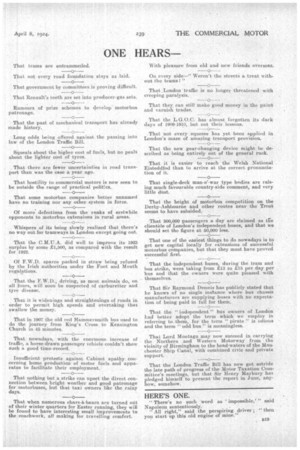ONE HEARS
Page 3

If you've noticed an error in this article please click here to report it so we can fix it.
That trains are entrammeilecl.
That not every road foundation stays as laid. That government by comm• ittees is proving difficult.
That Renault's teeth are set into producer-gas sets.
Rumours of prize schemes to develop motorbus patronage.
That the past of mechanical transport has already made history.
Long odds being offered against the passing into law of the London Traffic Bill.
Squeals about the higher cost of fuels, but no peals about the lighter cost of tyres.
That there are fewer uncertainties in road transport than was the case a, year ago.
That hostility to commercial motors is now seen to be outside the range of practical politics.
That some motorbus companies better unnamed have no training nor any other system in force.
Of more ▪ defections from the ranks of erstwhile opponents to motorbus extensions in rural areas.
Whispers of its being slowly realized that there's no way out for tramways in London except going out.
That the C.M.U.A. did well to improve its 1923 surplus by some £1,500, as compared with the result for 1922.
Of F.W.D. spares packed in straw being refused by the Irish authorities under the Foot and Mouth regulations.
That the F.W.D., driving, as most animals do, on all fours, will soon be suspected of carburetter and tyre disease.
That it is widenings and straightenings of roads in order to permit high speeds and overtaking that swallow the money.
That in 1907 the old red Hammersmith bus used to do the journey from King's Cross to Kensington Church in 46 minutes.
That nowadays, with the enormous increase of traffic, a horse-drawn passenger vehicle couldn't show such a good time-record.
Insufficient protests against Cabinet apathy concerning home production of motor fuels and apparatus to facilitate their employment.
That nothing but a strike can upset the direct connection between bright weather and good patronage for motorbuses, but that taxi owners like the rainy days.
That when numerous chars-à-banes are turned out of their winter quarters for Easter running, they will be found to have interesting small improvements to the coachwork, all making for travelling comfort. With pleasure from old and new friends overseas.
On every side" Weren't the streets a, treat without the trams!
That ,London -traffic is no longer threatened with creeping paralysis.
That they, can still make good money in the paint and varnish trades.
That the L.G.O.C. has almost forgotten its dark days of 1909-1910, but not their lessons.
That not every squeeze has yet been applied in London's maze of amazing transport provision.
That the new gear-changing device might be described as being entirely out of the general ruck.
That it is easier to reach the Welsh National Eisteddfod than to arrive at the correct pronunciation of it.
That single-deck man-o'-war type bodies are raising much favourable country-side comment, and very little dust.
That the height of motorbus competition on the Derby-Ashbourne and other routes near the Trent seems. to have subsided.
That 300,000 passengers a day are claimed as tife clientele of London's independent buses, and that We should set the figure at 50,000 less.
That one of the easiest things to do nowadays is to get new capital locally for extensions of successful motorbus companies, but that they must have proved successful first.
That the independent buses, during the tram and bus strike, were taking from £13 to £15 per day per . bus and that the owners were quite pleased with themselves.
That Sir Raymond Dennis has publicly stated that he knows of no single instance where bus chassis manufacturers are supplying buses with no expectation of being paid in full for them.
That the " independent " bus owners of London had better adopt the term which we employ in referring to them, for the term " pirate " is odious and the term " odd bus" is meaningless.
That Lord Montagu may now succeed in carrying the Northern and Western Motorway from the vicinity of Birmingham to the head-waters of the Manchester Ship Canal, with combined civic and private support.
That the London Traffic Rill has now got astride the late path of progress of the Motor Taxation Committee's meetings, but that Sir Henry Maybury has pledged himself to present the report in June, ahyhow, somehow.






























